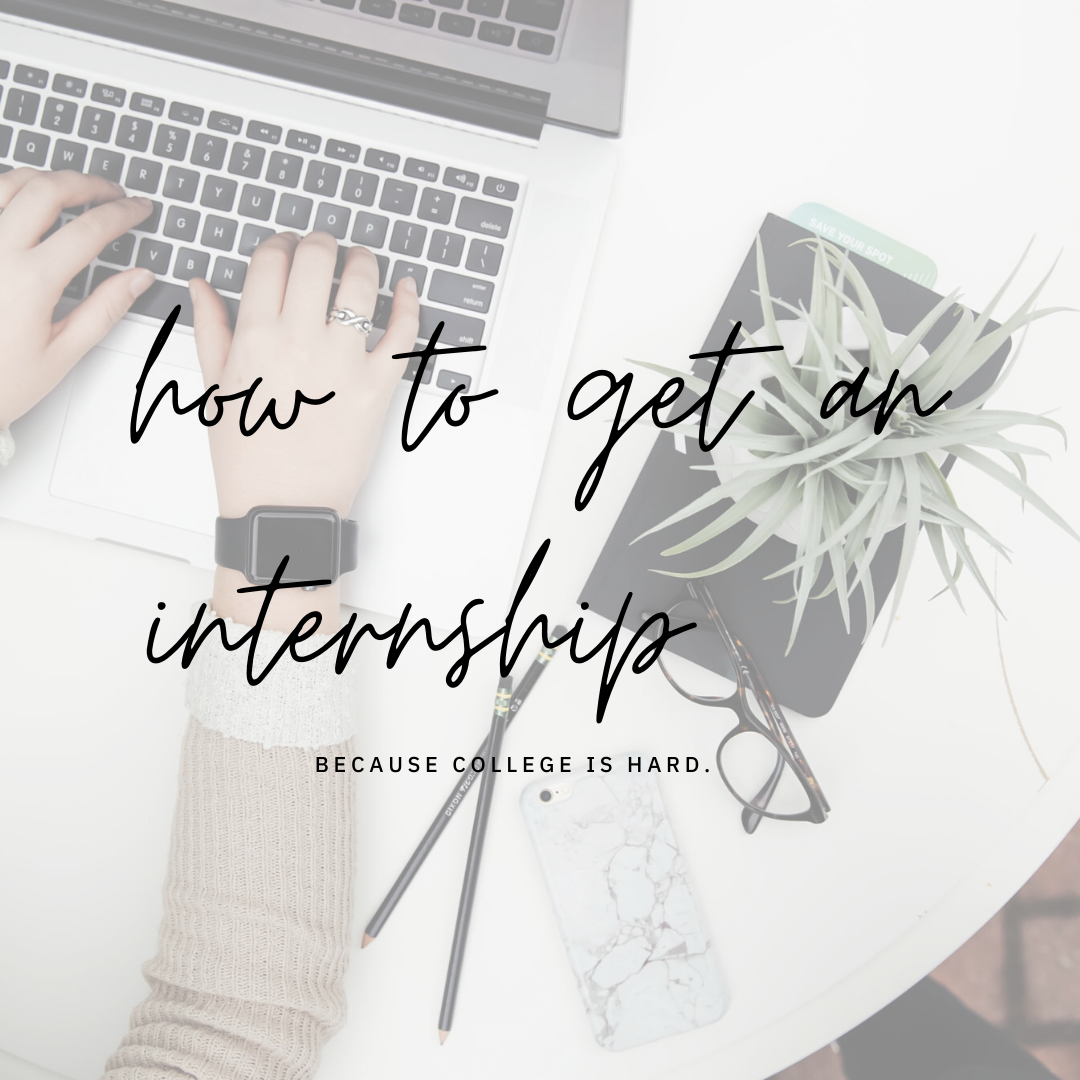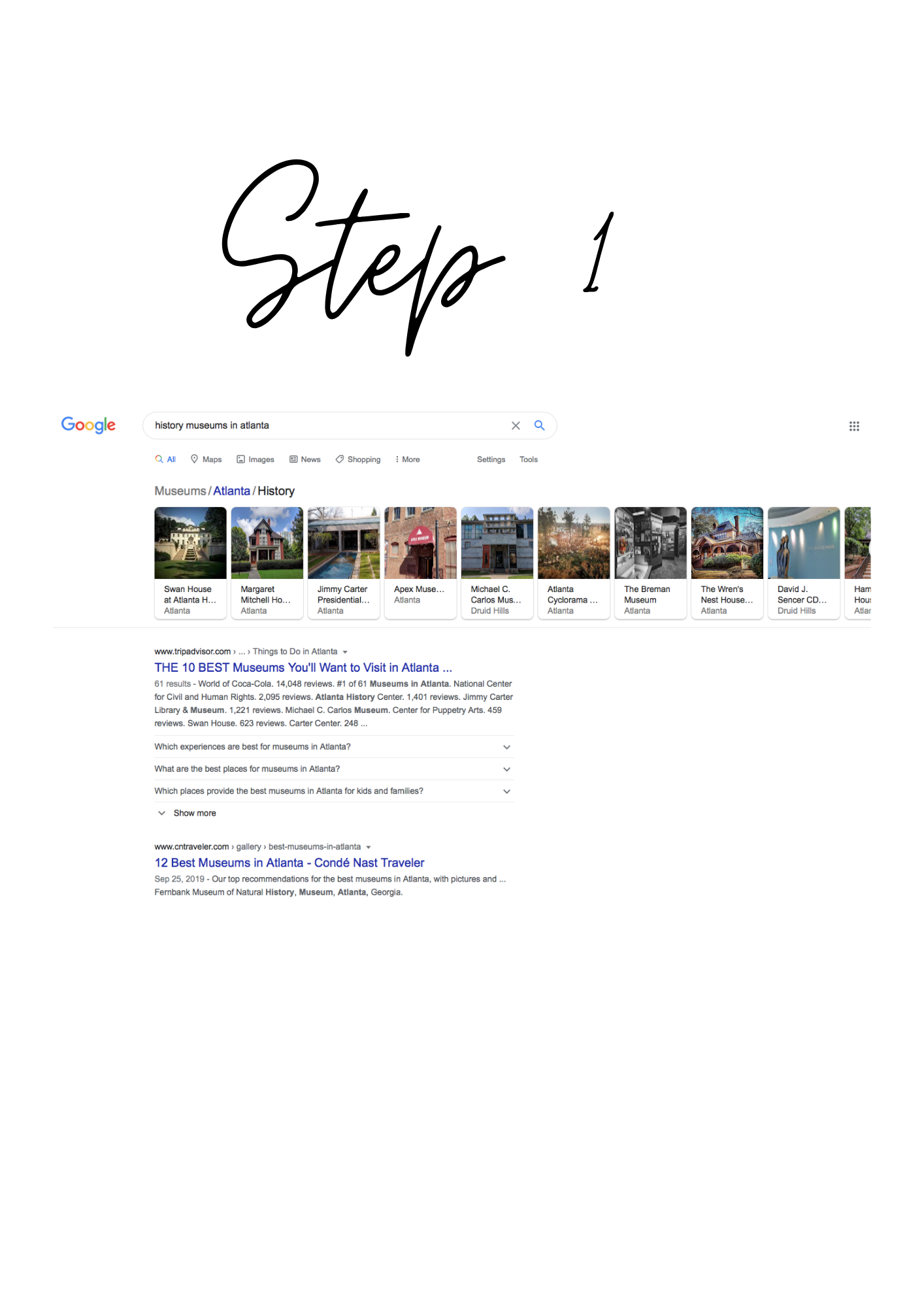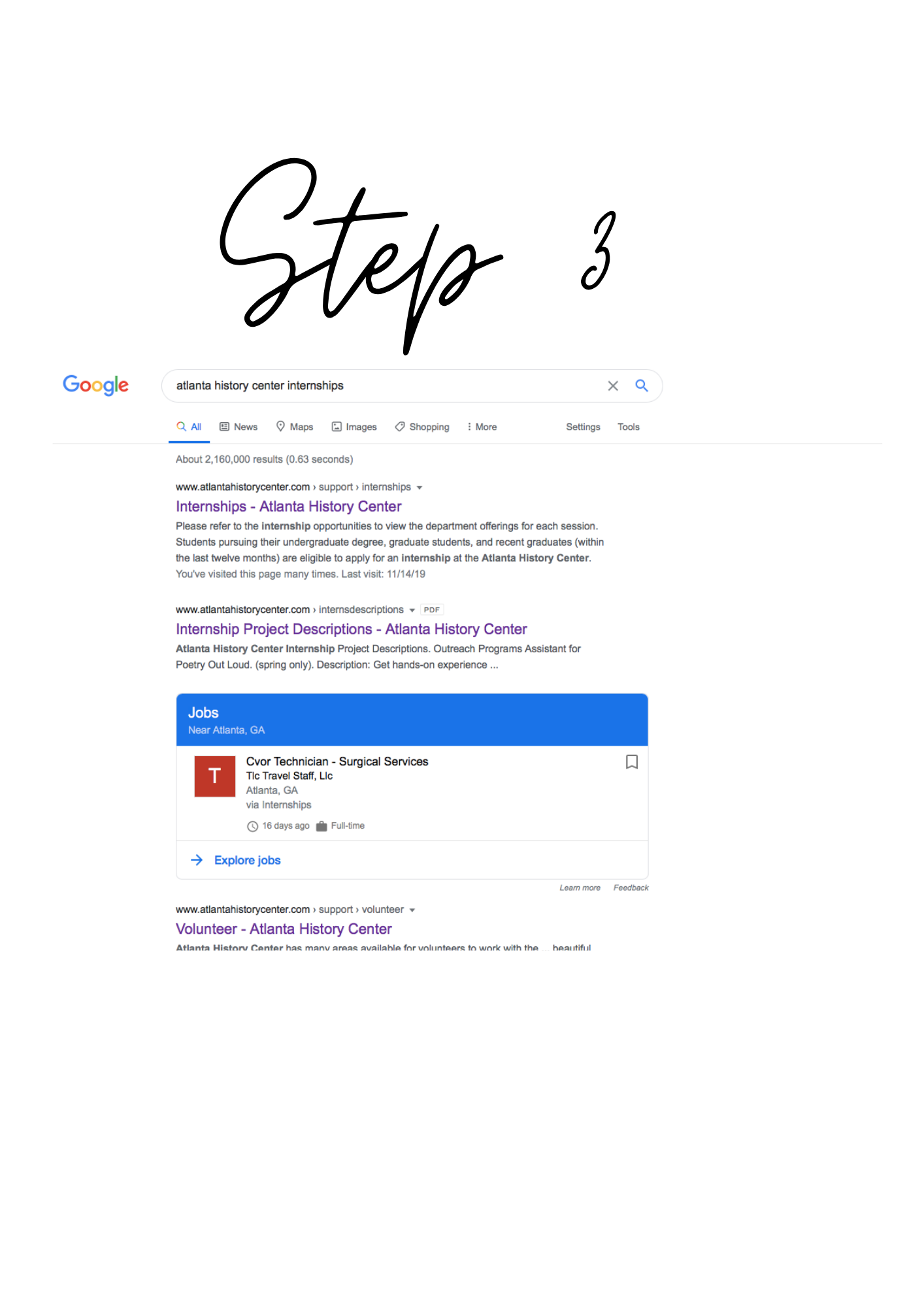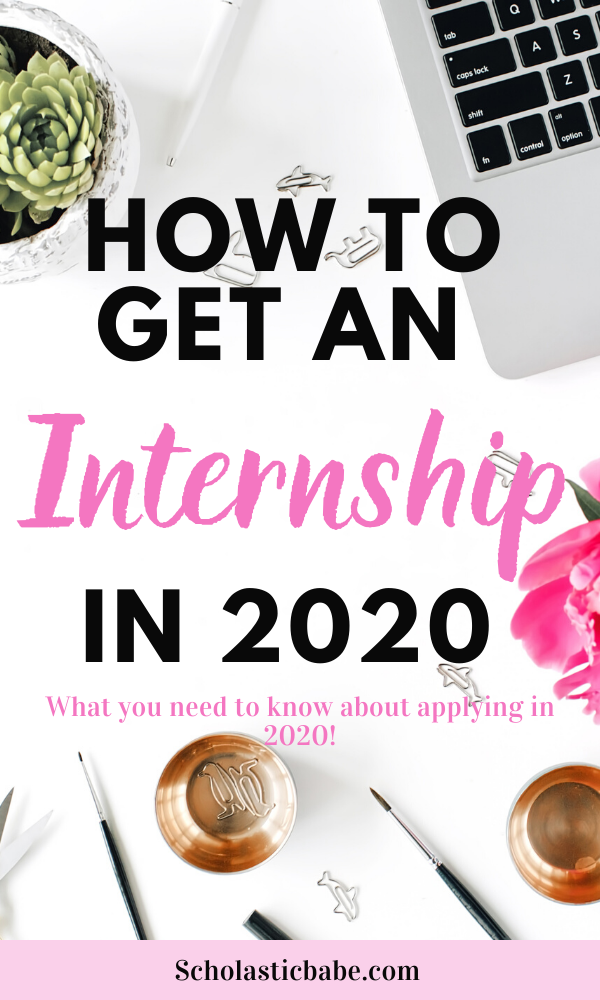How to get an Internship
When I started the internship hunt as a first-generation college student I had absolutely NO IDEA what I was doing.
I looked around on the internet and saw tips that said to check out internship search sites (I did), go to career fairs (I did), and to join tons of clubs (I did) and now I wish I could go back and shake myself.
While those were good advice and harmless in some respect, they didn’t tell me how to get an internship. They just told the very first teeny tiny step.
I’m gonna be brutally honest with you are probably NOT gonna find an internship at a career fair or on an internship search engine.
While some people get lucky, most people spend HOURS doing those things only to turn up empty-handed.
That was me.
After following that ineffective advice I decided to figure out my own way to get an internship and that way has landed me 2 internships all before my junior year. It didn’t matter that I was a freshman in college and it didn’t matter that I had little to no experience.
This is my secret sauce to finally start landing your dream internships.
In this article I’ll go over:
How to prepare before looking for an internship
Where to look for an internship and my steps
Application tips to get you hired!
So buckle up, its going to be a long one!
Take a look at your experiences
The very first step any future intern needs to do is do a complete audit of all your experience. You will need this information for ALL the steps of your application process from your resume to the interview.
I broke down my areas that could impact my application:
Jobs
Conferences
Hard & Soft Skills
Relevant Classes
Volunteer Work
Relevant Class Projects
Certifications
Clubs
It’s perfectly fine if you don’t have something for every category but those are some of the major categories where you can show your competencies and your skills.
The trap with most people who don’t have “any experience” is that they’re limiting themselves to what they consider to be good job experience.
You see especially when you’re looking internships or an entry-level positions EVERYTHING is experience. You just have to know how to communicate it. That what the industry professionals call *transferable skills*
When I applied to my first round of internships I had ABSOLUTELY no formal experience but how could I? I was a full-time student.
I figured there had to be things I had done in the past that would still be applicable to the job so I sat down for one hour and I brainstormed that list that I included and I wrote everything I did that was of note and not just what I thought they were looking for.
An Example of Page 1 of my Master resume
As you can see once I brainstormed all my experience I was able to break it down and visually see all the things I had done and what I had to offer.
P.S. The photo is my updated master resume I did not have that many skills when I applied! I learned most of them from my internships.
Another big thing to think about when you're looking at your skills and experience is, to be honest about where you could fill in more skills to make your more competent.
It’s way easier than it looks!
In my case, I’m a history major and I was looking at museums sites for my potential internships so of course, I mentioned clubs, classes, and the fact that I worked at my college library on my application but then I realized that there was a BIG gap that I was overlooking. I had never actually been in a museum long enough to know anything of substance about one.
When I realized this I started looking at museums in my city that accepted volunteers and I started volunteering every Sunday at my local museum. After doing this for a month I knew so much more about the industry that made my application stronger!
While the volunteer position only consisted of me handing out tickets and making sure people didn’t touch the exhibits, by spending a few hours every Sunday I started to realize things I never did before, like how the museum organizes their staff, what terms do they use when speaking to each, what issues pop up frequently.
All that insider knowledge helped me to land an internship as a sophomore with no “job experience” but I ended being able to talk specifically about what I learned from volunteering because I was doing it intentionally.
So if you’re in the same boat and you find that you are missing experience in an important part of your resume you can do things like:
take free online classes and list them on your resume. I recommend Skillshare (with a month free trial) and Udemy (which is free)
volunteering (which is easier in some industries that other) Pro tip: Find non-profits or public institutions in your industry because they usually need volunteers
Going to your career center/ or just browsing LinkedIn and reach out to alumni in your field to shadow or do informational interviews to learn insider knowledge about your field
Once you have gotten all your experience together now its time to…
Figure out where you want to intern!
This is advice that I don’t see in a lot of “how to get an internship post”. Usually, you hear to just keeping searching the internet until your fingers bleed, but I’m here to say that ish does not work.
Job/internship boards are a huge waste of time.
You gotta go directly to the source!
So say you’re an undecided major but you have an idea that you’d like to work in communications and phycology. Then you have to decide if you were to do communications, what type of work would you like to do marketing, writing, working at the news station?
You don’t have to just pick one industry! its fine to explore your interest. After you’ve settled on the different types of places you might be interested in working at.
Now its time for some truly mind-blowing advice….google them.
I’m not joking.
Here was my process:
I said to myself I know I wanted to be a history major (so in my case it was more narrow) and I knew I was interested in museums or summer camps in terms of the types of internships people in my major could do (there are plenty of other types but those were just what I was interested in)
It was easy after that I typed in “History museums in Atlanta”
I got a list of about 12 or so and I wrote them down.
The next search I did was to individual look at all the museums in Atlanta to find their “internship/careers” page. After that search along I found 9 of them were looking for spring interns!
That was crazy because just a few weeks earlier I had been looking through Handshake my school’s internship search platform and I didn’t see any of them listed!
So if I hadn’t looked for myself I would have missed out. Even better for me, I was able to directly apply on their website so I knew they would see my application and I wasn’t just sending it into the ether.
You see a lot of these businesses either don’t know how to work with the major internship search engines or they forget to update their applications each season but I can bet you 9 out of 10 times they have all the information you need on their website!
Also, don’t be scared if you find the companies website and there are no internship listings. If they have a contact email or HR email you can email directly and ask about openings.
To recap my internship search process:
Pick industry/ types of business you'd like to intern for
Do a local search so “X type of business in your area”
Make a list of the ones that interest you
Start looking on each business site individually to see if they have any internships/careers page or even a hiring email!
Talk to your professors
It’s crazy how most of us pay THOUSANDS of dollars to go to a school so we can have access to the professional networks yet we never utilize it.
I admit that was me when I first started internships search I was scared to broach it with my professors because I didn’t want to seem annoying but then I had a big lightbulb moment. I pay tuition so that I can access people in my field so I’m wasting my money if I don’t make use of that access while I can.
Of course, you still have to be considerate of the fact that professors are busy but you also have to realize that they are there to provide a service to you as a student.
During my freshman year, I formed a great bond with my now mentor because she had a career that I strongly admire, so after getting over my nerves I made a random appointment with her and told her about my interest in interning at a museum. She was so helpful and I felt stupid for not approaching her sooner.
At that point, I had already had my list of places to apply to but she was able to give me great feedback on my application and tell me what she thinks the locations would be looking for in a great candidate, while I had thought my applications were polished she was able to point out areas that weren’t clear and little typos that I didn’t catch after hours of revising.
So whether it be asking for application advice, someone to review your materials, or asking if they know any internship openings, make use of your professors during the internship application because I promise they know a whole lot more about what you need to include in your application.
Look at your peers
I’m gonna be honest, I’m a LinkedIn lurker.
But I don’t think its a bad thing.
Do you remember how I mentioned I’m a first-generation college student? well when I wanted to understand what internships were even possible or what to look out for I didn’t have anyone in my direct circle to look to so I started to look at the people at my college.
A tip I mention in my How to set up your LinkedIn profile post is to connect with your peers on LinkedIn but what I didn’t mention in that post that the biggest reason having more connection on LinkedIn can be beneficial to you is that you got to see the types of internships people at your college do.
I connected with a few upperclassmen that I had met in passing on LinkedIn and to this day I still learn so much about the industry from them. I get to see what they're doing post-grad but also what clubs they joined, where they interned, and other things that can give me an idea of the types of options I may have as someone in that field as well.
Of course, don’t be a creep but LinkedIn is a search engine as well and it’s okay to use it strategically to see what students you look up to are doing.
I’ve definitely seen someone post about an internship that they're doing and then went over to the companies site to see if I would want to apply in the future.
All of this active research on your part will give you more direct sources to internship opportunities that suite you and your goals rather than searching aimlessly on a job board.
Update your professional networks like LinkedIn/ Google yourself
This tip is super important to do before you even send out your applications. If you’ve ever wondered if employers really google you. Yes, they do. I know this because I’ve had interviewers mention work on my online portfolio which is one of the first things that come up when you google my name.
So you wanna make sure that when employers google you they don’t see your anything that you wouldn’t approve of. Having things such as an active LinkedIn profile and an online portfolio tend to rank high in SEO (search engine optimization) meaning they will be more likely to be at the top of google searches because they have lots of information.
The bare minimum you need to do is to actively maintain your professional networks. Give employers a good place to land to get an overview of who you are so they don’t have to keep scrolling until they see that picture of you at the frat party that you took 2 years ago.
Look in the right places
You probably get the idea by now but let me make it super-duper clear, where you look can make or break your internship process. Instead of spending hours looking for positions you can spend that time tailoring a kick-ass application that will actually get your hired.
Job search boards have had their place in the past but you can’t rely on them alone, especially not in 2020. I won’t lie to you I still check handshake (though I’ve given up on internships.com) and I occasionally see an internship I might be interested in doing but the most success I’ve had and, even my friends who I’ve helped in their search, is to do targeted research on companies that you’re actually interested in.
Some of my favorite places to look are of course Google, Linkedin (as I mention see what internships people at your school are doing!), and also Facebook!
Facebook is great because its more likely to be people you know. While it isn’t as reliable as Google or LinkedIn, it can still be a great place to hear about internships from people you know.
The best place to find an internship on Facebook is usually your college Facebook groups. No, I’m not talking about the one huge group where everyone and anyone can join I’m talking about specific groups like major, class year, and clubs and stuff.
I’m apart of 7 Facebook groups for my college (even though there literally tons!) but I pick the ones that feel the most relevant to me so my Facebook page isn’t flooded with crap. But every now and then the history major Facebook group that I’m a part of will post positions and even my class of 2022 group will post internships.
If you're a Facebook user and you’re not apart of any group boards for your college you need to get on that. Just do a quick search with your college’s name and group board.
Create an internship toolkit
It should your resume, cover letter and letters of Recommendations
Now we’re getting into the juicy stuff!
If you’ve stuck with me this far, congrats!
During a typical application cycle, most people will apply to anywhere from 5 to 20 internships. When I first started applying to internships in my freshman year I applied to about 20 and got rejected from all of them.
Now looking back I can see why. In my goal to just get one internship I figured I would increase my odds by applying to a ton, but this actually backfired big time because I didn’t give enough time for each application to make it compelling.
I had always seen those posts where people say that applied to a hundred jobs before they ever got one and now when I see those post I think “yikes!” because I also had that mindset but its a TRAP.
You shouldn’t be proud to send out a bunch of generic applications. In a job search, you don’t need to think of it as numbers game especially in this economy where recruiters are looking for specific skills and someone who can fit into the company.
When you start crafting your resume, cover letter, and other application material the BIGGEST tip I can give you is to make it super specific to that job. I know it takes way more time.
That was me, but I had to come to the realization that more time I spent on an application the more likely I was to be called for an interview which was true.
The first internship I got, I spent over two weeks not only writing my application materials but also having it revised by my school’s career development office, my mentor, and class tutors.
It was a slow and painful process for someone like me who is always on the go, but from doing that I learned so much about what was left out in previous applications that would have made my application stronger and after doing that a few times I felt confident enough to do that review process for the internship I’m currently doing and sending in a stellar application.
When you start to put your application materials together aways double-check by going the internship posting to make sure you hit and address the first few skills and competencies that they listed because those were the first things that they thought about when they were looking for people to fill that position.
Don’t include things that aren’t relevant to that position no matter how great you think they are. Pick things they are asking for or things that relate to what they are asking for.
It’s not about how awesome you are but it’s about what can you bring to the company and the secret is you don’t have to pull this answer from anywhere its in the job description!
Read: How to Write a Cover Letter that Gets you Noticed
Don’t be afraid to follow up to ensure they’ve gotten your application
I’ve had a couple of situations where I’ve sent an application a few days later I never get a reply saying whether they receive my application of not. This can be more common if you send your application through some sort of online portal.
Instead of sitting and agonizing over whether they received your application or not if a few days passed don’t be afraid to send a polite follow-up email to know if they received your application. This can show that you’re seriously interested in the position.
This isn’t something you should do with every application but what a lot of applicants don’t do is to advocate for themselves and to really make it know that you are interested in the position which includes making sure your application got to where it needs to be.
Know your value and what you bring to the table
Hey now! You’re at the end and I wanted to wrap up on a note that during the application process you have to know your value! That why I started off by going over what skills or experience you have because so many of us sell ourselves short.
Imposter syndrome is a bitch.
Everyone has some unique background or ideas that only they can bring to the table and when your applying for internships in a competitive market you have to do some digging and think about what makes you special in the application process and hold on to that.
Whether it be your identity, your personality, your academic background, pick one area that is a big deal for you and see how that is reflected in your industry. Know what you offer in terms of adding to your industry and company dynamic could make or break your application.
I’m sure I wasn’t the BEST applicant that applied to my internship site but I knew that I could bring in an outside perspective as someone who grew up low income and wasn’t even aware of the industry until my late teens.
Dig deep and find your special sauce and don’t be afraid to share that with the world.
I hope you enjoyed this article!
Please let me know if this helped you or if you want clarification on something. I post new blog posts at 11 am on Monday, Wednesday, and Friday so check back if you want more college and career advice!















